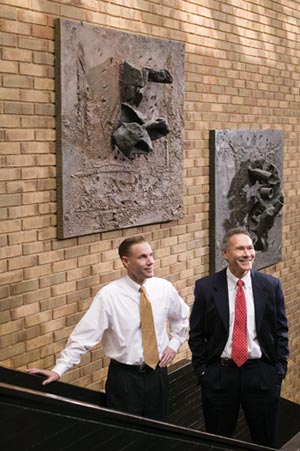|
Filling niches, meeting needs Security-related firms are the core businesses for CoverX By Elisabeth Boone, CPCU
While the standard market blows hot and blows cold, retail producers know they can count on reputable managing general agents and managing general underwriters to provide a stable market while providing the expertise to evaluate and underwrite a wide range of risks. A company that perfectly fits that mold is CoverX Corporation, an underwriting manager based in Southfield, Michigan, that operates nationwide on a nonadmitted basis. Founded in 1973 in response to dislocations in the commercial liability market, CoverX pioneered general liability coverage solutions for security guards, private investigators, alarm contractors, and fire suppression system contractors, and today continues to focus on identifying specific niches in industries and professions that are underserved by the traditional general liability market. This entrepreneurial mindset, coupled with the experience and ability to successfully develop liability programs that meet customer needs and expectations has led to further product expansion, as evidenced by CoverX’s creation of a Specialty General Liability Division (now known as the Primary Casualty Division) in 2000 to underwrite coverage on a nonadmitted basis for small to medium-sized construction contractors, energy risks, products liability for manufacturers and distributors, and premises and operations coverage for apartment buildings, hotels, restaurants, warehouses, and shopping centers. Retail producers can access these coverages through selected wholesalers. Underwriting talent Underwriting liability coverages, especially for risks with above-average exposures, requires a high degree of experience and discipline. At CoverX, those qualities are brought to the table by a team of veteran underwriters. John Bures, vice president of underwriting for the firm’s core program (security guard, alarm, and fire suppression contractor business), joined CoverX in 2000 after holding underwriting management positions with Hartford, Travelers, and the former Reliance Insurance. Joe George, who heads up the Primary Casualty Division, also possesses a wealth of specialty liability underwriting experience. His background includes casualty underwriting management positions with the London Agency (now Westchester Insurance) and Lexington Insurance. George also started an excess/surplus operation for USF&G and, before joining CoverX in January of this year, was with Renaissance Re in Bermuda. Post-9/11 challenges For an underwriter like CoverX that specializes in meeting the liability needs of the security industry, the landscape has been dramatically and irrevocably changed since the terrorist attacks of September 11, 2001. “Certainly the events of 9/11 have had an impact on capacity for security guard risks at the same time that the industry has been experiencing heightened demand for it services,” Bures observes. “Security is becoming more sophisticated in terms of technology, and the onus is on underwriters to keep pace with trends and developments in the industry.” What’s more, he says, “The government is more active in providing security than it was pre-9/11, and there’s been considerable intermingling of the private sector and the public sector.” Another trend he identifies is the increased use of security consultants by the owners of properties who need assistance in assessing their exposures to terrorism. Insuring consultants is a relatively new venture for CoverX, Bures says, and the firm strives to provide a market for these risks. Because of its depth and breadth of experience in the security guard industry, Bures notes, CoverX enjoys a competitive advantage in this market. “We have over 30 years of history underwriting this business, and on most of that business we’ve developed our own loss experience, he says. “We’re a full-service operation: We assume risk, we manage the claims, and we have our own loss history and our own data to draw upon. We consider ourselves more of an insurance company than a general agency.” CoverX underwriters, he points out, have the experience to understand the contractual obligations between a security guard firm and the client properties it protects, and to tailor coverage that addresses those obligations. Another competitive advantage for CoverX, Bures notes, is that “our carrier is an affiliated company, so we’ve eliminated the availability and consistency issues that general agents frequently face with regard to the insurance companies that they represent.”
Product offerings For the security industry, CoverX offers a range of general and professional liability coverages, including bodily injury, personal injury, property damage, blanket additional insureds, waiver of subrogation, theft, assault and battery, errors and omissions, employee benefits liability, and lost key coverage. Coverage can be written for any size account, from a one-person operation to a national firm. Both new businesses and established accounts are eligible. Coverage is written with A.M. Best A rated carriers. Insureds have a range of deductibles for SIR choices and may obtain a composite rate. The same coverages and features are available to private investigators and to commercial and residential fire suppression, safety equipment, and alarm contractors for all aspects of their operations: sales, service, monitoring, and installation. The programs are accessible primarily but not exclusively through wholesalers. “The starting point for us is the ability to file E&S taxes,” Bures explains. “We have a couple of large retail specialists, but we’re primarily working with wholesalers.” Primary casualty Tackling equally tough risks is the CoverX Primary Casualty Division, which provides coverage exclusively through wholesalers. “Primary Casualty is an opportunistic type of underwriting venture versus a core program situation,” George explains. “The kinds of risks that flow into and out of this facility depend to a large extent on what the standard market does and how companies class underwrite risks. Every time a company goes through a disruption or dislocation on classes or underwriting approaches, we step in to fill the need.” “Being a safety valve for these risks is the benefit we provide, and I think it’s also a competitive advantage,” George comments. “Although we are relatively small, with four regional offices—in Boston; Chicago; Naples, Florida; and Allen, Texas—each office is staffed with lead underwriters who have 20-plus years of experience, and that allows us to execute our strategy.” Retail producers can easily access CoverX’s primary casualty programs. “We deal with all the major wholesalers in the U.S., so retailers would be hard pressed to find a wholesaler that we don’t work with,” George says. “Even if we didn’t have a relationship with a certain wholesaler, we would look at that facility, and if it handled the type of business we’re interested in underwriting, we would approve that facility.” Eye on the market How do veteran underwriters Bures and George assess current conditions in the market for their specialized liability classes, and what trends are emerging in these markets? On the primary casualty side, George observes, several key trends distinguish the market of today from that which prevailed some years ago. “First, it is a more competitive market this year than last,” he says. “It’s still a surcharged market. Rates are remaining level, or rate increases have decelerated. There are still good opportunities out there. Over the next two to three years, I think the market will continue to become more competitive, but very slowly,” he observes. “New players will probably enter, and I think we’ll see some companies restructuring.” Second, he notes, today the stock market is not the factor it was in the 1990s, “so the industry can’t depend on the capital markets to provide a return as it did then.” Third, with respect to reinsurance capacity, George says, “There are fewer reinsurers today than there were in the 1990s—some have gone under—and I think they’re not as naive as they were in the ’90s. We don’t see reinsurance driving the market as it did in the ’90s.” Pointing to a fourth trend, George remarks that “today we have more legislative scrutiny with all the Spitzer investigations, so I think competitors tend to act a little bit differently.” Finally, he says, “I think investors expect more return now than they have in the past. All the investors I know of are looking for some pretty good return from insurance companies to compensate them for the risk they take being in the E&S market.” Over the next three years, George concludes, “I think we’re looking at a fairly good market from a casualty standpoint.” Staying committed With the security industry becoming increasingly sophisticated in terms of technology, and given the growing demands on security firms in the post-9/11 environment, Bures observes, “The challenge for us is to continue to keep pace with the industry’s changing methods and techniques.” Another factor, he says, is “what ultimately happens with TRIA (the federal Terrorism Risk Insurance Act, which is set to expire on December 31 of this year). If that were to go away or change, that could adversely affect insurers’ appetite for security guard risks.” After 9/11, “when a lot of people ran away from the security industry, we were able to hang in there and understand the changes that were taking place,” Bures remarks. “Right after 9/11, we might have been the only underwriter that stayed open to airport-related security risks.” Today, he says, “Our challenge is to stay abreast of changes in the industry, to draw upon our experience in the market, and to continue to meet the needs of our customers, which we are committed to doing.” * For more information: |
||||
|




